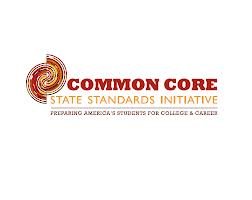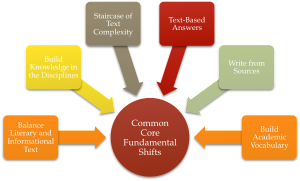The Value of Common Core in Schools
Santa Rosa Press Democrat
2/6/2014
By: Michael Haran
George F. Will’s article (The Common Core is Worth Opposing 1/17/2014) is amazing in its “conservative” mentality. He bashes the Common Core Standards as a continuation of “Fifty years of increasing Washington inputs into K-12 education that has coincided with disappointing cognitive outputs from schools.” Hello? This is exactly why the Standards were enacted. 
Will’s reminds us that the 1965 Elementary and Secondary Education Act, the 1970 General Education Provisions Act an d the 1979 law that created the Department of Education are all federal intrusions into what he calls, “state and local responsibility for curriculum control.” He complains that “what begins with national standards must breed ineluctable pressure to standardized educational content.”![]()
He notes that, “Washington already is encouraging the alignment of the GED, SAT and ACT tests with Common Core. By a feedback loop, these tests will beget more curriculum conformity. All this, he contends, will take a toll on parental empowerment.”
What Will fails to recognize, or admit, is that all his criticisms are why the standards were initiated. He says that “it is more likely there will be a half a dozen innovative governors than one creative federal education bureaucracy.” With this remark Will is right. The Common Core Initiative was established by the National Governors Association, many of which are Republicans, and the Council of Chief State School Officers based on a 2004 report titled, “Ready or Not: Creating a High School Diploma That Counts.” It found that both employers and colleges are demanding more of high school graduates and that current high-school exit expectations fall well short of demands.
 In his article “Why Our Nation Needs Common Standards,” (Hechinger Report, July 18, 2013) Jonah Edelman said “The Common Core Standards are clear and high standards for what every child in the United States should know by the end of each grade and are a practical and effective solution for a system that now dooms some students to learn far less than their peers who happen to live in other states.
In his article “Why Our Nation Needs Common Standards,” (Hechinger Report, July 18, 2013) Jonah Edelman said “The Common Core Standards are clear and high standards for what every child in the United States should know by the end of each grade and are a practical and effective solution for a system that now dooms some students to learn far less than their peers who happen to live in other states.
They benefit students in states with weak academic standards. They benefit teachers who want to access and share the best possible lesson plans. They benefit parents who have a right to know that an “A” in school or a “proficient” on the state test actually means their child is on track.
Will insinuates that Common Core roll out is experiencing the same “federal touch” that has given us HealthCare.gov. What he doesn’t say is that all new government programs experience roll-out problems. Social Security did, Medicare Part B did and Common Core will.
The biggest problems are cost and technology. Georgia spends 8-9 dollars per student to administer five-subject tests compared to the Common Core’s new per-student cost estimate of $29.50 for just two tests. Only 28 percent of Oklahoma school districts have the infrastructure necessary for the new exams. Both of these problems will be addressed as the $4.35 billion Race to the Top money is released to states when the Common Core Standards are initiated in the 2014-15 school year.
People like George Will look at progressive education as a bad thing. They don’t like change even though change is inevitable. Technology has made the U.S., like the world, a smaller place. Education conformity makes America’s workforce more efficient which allow people to move to where the jobs are. Will calls Bill Gate’s remark: “It’s ludicrous to think that multiplication in Alabama and multiplication in New York are really different,” flippancy. I call it common sense – I call it Common Core.

Recent Comments